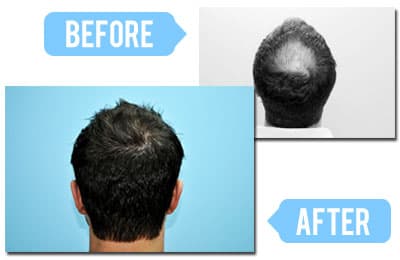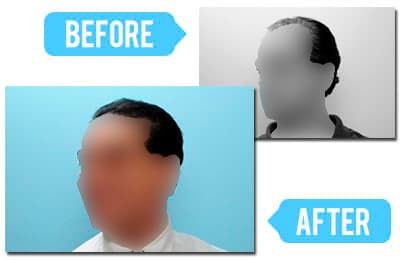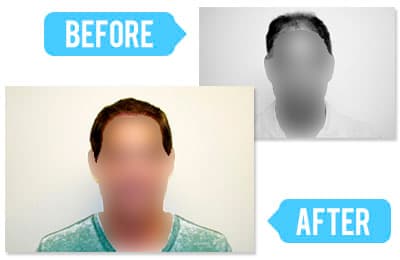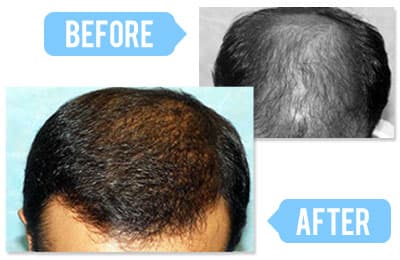Hair loss affects millions of men and women around the world, with adults aged 30 to 60 being particularly impacted. But it's not just about hair—losing it can hit confidence levels hard and create emotional stress. For those who aren’t ready to commit to a surgical hair transplant, non-surgical alternatives offer effective, less invasive solutions.
This guide explores eight non-surgical options, breaking down what they are, how they work, and why they could be a great fit for your hair restoration goals. Whether you're dealing with thinning hair, bald spots, or just want to slow hair loss, there’s something here that could work for you.
1. Topical Treatments
Minoxidil
Minoxidil is one of the most widely known treatments for hair loss, available over-the-counter and FDA-approved. Applied directly to the scalp as a foam or solution, it works by boosting blood flow to the hair follicles, stimulating regrowth, and extending the growth phase of hair.
- Best for: Early-stage hair loss or thinning.
- Timeline for results: Visible improvements often take 3 to 6 months.
- Potential side effects: Scalp irritation or unwanted hair growth on other areas of the body.
Finasteride
Unlike Minoxidil, Finasteride is taken orally and is available by prescription. It works by lowering levels of DHT (a hormone linked to hair thinning), which can slow or even reverse hair loss.
- Best for: Men experiencing male pattern baldness.
- Potential side effects: Reduced libido or other hormonal changes, which makes it less commonly recommended for women.
Tip: For the best results, these treatments often require long-term commitment.
2. Platelet-Rich Plasma (PRP) Therapy
PRP therapy might sound complex, but the process is relatively simple and quick. Blood is drawn from your arm, concentrated to isolate platelets, and then injected into your scalp. These platelets are rich in growth factors that stimulate hair follicles and promote thicker, fuller hair.
- Sessions required: Typically 3 to 4 initial treatments over a few months, followed by maintenance sessions.
- Is it effective? Studies suggest PRP can significantly boost hair density and thickness.
3. Low-Level Laser Therapy (LLLT)
Low-Level Laser Therapy uses light energy to stimulate cellular activity in hair follicles. Devices like laser combs, caps, or helmets can be used at home, while some clinics offer in-office treatments.
- How often? 2 to 3 sessions per week are common for at-home devices.
- Results: Increased hair density and possibly slowed hair loss with consistent use.
With LLLT, there's no pain or downtime—it’s as simple as putting on a laser cap while you relax at home.
4. Scalp Micropigmentation (SMP)
Scalp Micropigmentation is a cosmetic procedure that involves tattooing tiny dots on the scalp to mimic the appearance of hair follicles. This creates the illusion of a fuller head of hair.
- Good for: Those dealing with advanced hair loss or alopecia.
- Maintenance: Depending on your lifestyle and skin type, touch-ups may be needed every 2 to 5 years.
- Tip: Always work with a certified practitioner to ensure natural, high-quality results.
5. Microneedling
Microneedling involves using a device with fine needles to create micro-injuries on the scalp. This stimulates collagen production and enhances hair follicle health. It’s often paired with topical treatments like Minoxidil for amplified results.
- Benefits: Improves the absorption of topical treatments and promotes circulation.
- Side effects: Temporary redness or irritation is possible.
6. Nutritional and Lifestyle Modifications
Your diet and lifestyle play a big role in your hair health. Ensuring you eat the right foods and keep stress levels in check are foundational to preventing and managing hair loss.
Dietary Adjustments
Certain nutrients are vital for hair growth:
- Biotin: Found in eggs, nuts, and seeds.
- Zinc: Found in shellfish, meat, and dairy.
- Vitamins D, C, B2, B9, and B12: Found in leafy greens, citrus fruits, and fortified cereals.
Stress Management
High stress levels can trigger hair loss. Adopting practices like yoga, meditation, or even ensuring better sleep can help protect your hair in the long run.
7. Alternative Therapies
For those looking for a more natural approach, alternative therapies might be worth exploring.
Herbal Supplements
Saw palmetto, a natural DHT blocker, is often compared to Finasteride. However, always consult your healthcare provider before starting any herbal supplement.
Essential Oils
Oils like rosemary and peppermint are believed to stimulate hair growth. Massage them into your scalp to boost circulation, but be sure to test for allergies first.
8. Combining Treatments
Although each of these treatments can be effective on its own, combining them may yield better results by tackling hair loss from multiple angles. For example:
- PRP + Microneedling: Enhance follicle stimulation.
- LLLT + Minoxidil: Boost effectiveness for early hair thinning.
A customized, tailored approach often delivers the best results. Consulting a dermatologist or hair restoration specialist can help you design a treatment plan that works for your unique needs.
Professional Advice Matters
Choosing the right hair loss treatment can feel overwhelming. That’s why consulting with a healthcare professional or dermatologist is critical. They'll assess the severity of your hair loss, identify any underlying causes, and recommend suitable treatments tailored to your needs.
It’s also important to set realistic expectations—non-surgical options may slow hair loss or improve hair density, but they won’t guarantee the same transformation as a full hair transplant.
Take Control of Hair Loss Naturally
Hair loss is not something you have to accept without a fight. From topical treatments like Minoxidil to cutting-edge therapies like PRP and LLLT, there are options for every stages of hair loss. With the addition of healthy habits, like a balanced diet and stress management, you’ll set yourself up for long-term success.
Start exploring these treatments and consult an expert for further guidance. Sometimes, the best "hair-raising" decisions are the non-surgical ones.



